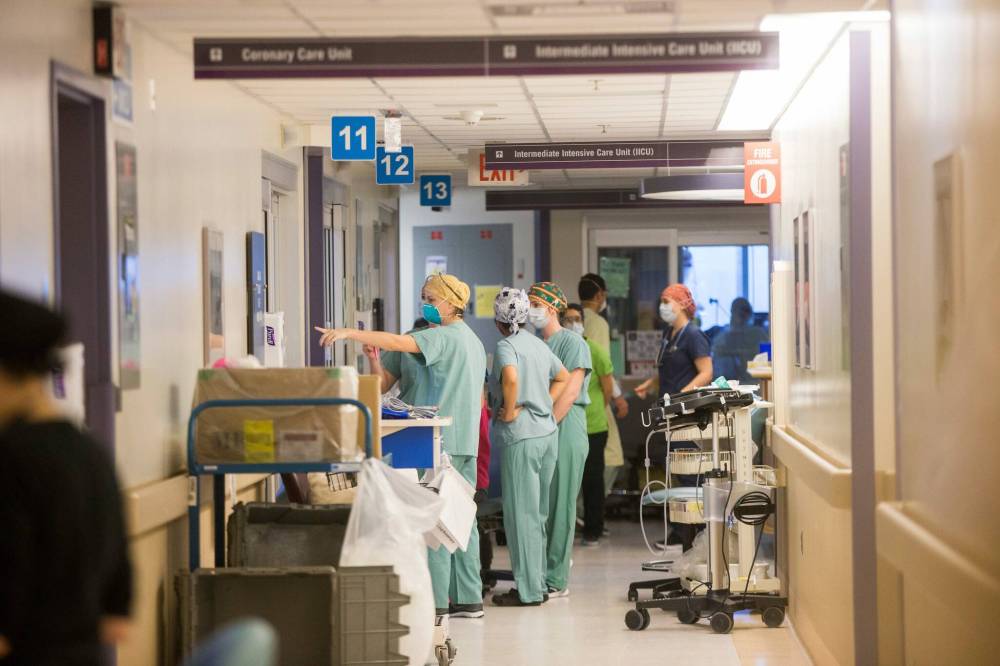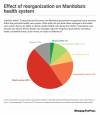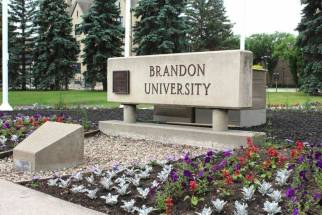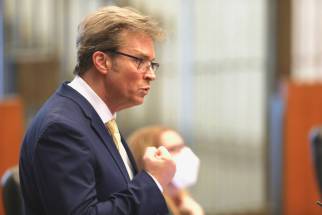Hospital crisis puts U of M medical-school programs in danger Accreditation in jeopardy over supervision, ‘safe learning environment’ concerns
Read this article for free:
or
Already have an account? Log in here »
To continue reading, please subscribe:
Monthly Digital Subscription
$0 for the first 4 weeks*
- Enjoy unlimited reading on winnipegfreepress.com
- Read the E-Edition, our digital replica newspaper
- Access News Break, our award-winning app
- Play interactive puzzles
*No charge for 4 weeks then price increases to the regular rate of $19.00 plus GST every four weeks. Offer available to new and qualified returning subscribers only. Cancel any time.
Monthly Digital Subscription
$4.75/week*
- Enjoy unlimited reading on winnipegfreepress.com
- Read the E-Edition, our digital replica newspaper
- Access News Break, our award-winning app
- Play interactive puzzles
*Billed as $19 plus GST every four weeks. Cancel any time.
To continue reading, please subscribe:
Add Free Press access to your Brandon Sun subscription for only an additional
$1 for the first 4 weeks*
*Your next subscription payment will increase by $1.00 and you will be charged $16.99 plus GST for four weeks. After four weeks, your payment will increase to $23.99 plus GST every four weeks.
Read unlimited articles for free today:
or
Already have an account? Log in here »
Hey there, time traveller!
This article was published 27/04/2022 (1323 days ago), so information in it may no longer be current.
Manitoba’s hospital system is stretched so thin that a national regulator has threatened to suspend some training over concerns doctors are too busy to safely teach medical residents, the Free Press has learned.
No one expects the University of Manitoba will lose its standing to train doctors, but hospital physicians say the regulatory warnings are a sign of a system in crisis.
“Three programs are on notice of intent to withdraw,” reads an internal email that medical dean Dr. Brian Postl sent faculty in March, explaining that the accreditation-review team had concerns over whether “residents are appropriately supervised” and “resident education occurs in a safe learning environment.”

On behalf of the Royal College of Physicians and Surgeons, regulators assessed 46 U of M programs last month, interviewing medical residents and the doctors who supervise them about the quality of education.
Three of the 46 programs were flagged as insufficient: neurology, core internal medicine and obstetrics and gynecology.
Postl told the Free Press the pandemic strained a system that was already under pressure from government austerity.
“It would be disingenuous to think they aren’t related,” he said.
“COVID arrived into a system that was not prepared for it, and was already stretched remarkably thin (and) had been living with budgets of austerity for several years.
“And superimposed on that was a significant restructuring that was changing the way things worked.”
“The morale is very poor among faculty; they were swamped and overloaded with work. The residents provide service (to hospitals) but they were used to look after patients excessively, and that probably interfered with the ability to deliver an educational program.” – Unidentified doctor
Some doctors working in Winnipeg hospitals agreed, acknowledging the system does not deliver optimal care to patients, let alone provide an environment where trainees can reflect and seek evaluation.
“There are so many patients to look after that both residents and staff are overwhelmed,” said one longtime doctor not authorized to speak with media.
“So education takes up a smaller part of the pie diagram of time, energy and attention, than the service of taking care of patients.”
Another doctor in a supervisory position offered a similar assessment:
“The morale is very poor among faculty; they were swamped and overloaded with work. The residents provide service (to hospitals) but they were used to look after patients excessively, and that probably interfered with the ability to deliver an educational program.”

In some cases, limited nursing resources were shifted to COVID-19 wards, which added hands-on care of patients to doctors’ responsibilities and left far less time to evaluate their residents.
Some specialists ended up screening emergency-room patients, a duty residents normally undertake, but many were too busy on wards.
Experts were particularly concerned that core internal medicine was among the three flagged programs, because doctors need to complete that residency before moving onto more specialized branches of internal medicine, such as nephrology, rheumatology or cardiology.
Postl said his neurology program is hampered by Manitoba’s shortage of neurologists, which makes it difficult to train more. The few working in the field have large patient loads, and a new stroke program is not yet fully staffed.
It’s not uncommon for one neurologist to be on call in the city treating all of the patients experiencing strokes, doctors say.
“COVID arrived into a system that was not prepared for it, and was already stretched remarkably thin (and) had been living with budgets of austerity for several years.” – Dr. Brian Postl
Obstetrics has also faced staff shortages, Postl said, which “probably stressed the relationship in that teaching environment.” He noted that residents training to become family doctors often have a brief module in obstetrics, meaning they need access to supervisors during that short time in order to gain the competencies required to graduate.
The Professional Association of Residents and Interns of Manitoba said it wouldn’t comment on Postl’s interim assessment until the final report had been filed.
“Resident-doctors work incredibly hard to provide frontline medical care to Manitobans around-the-clock in all corners of the province, all the while completing their advanced clinical training,” wrote association head Dr. Josh Aquin.
He called for “a working and learning environment that is safe, respectful, and inclusive.”
It is rare for a medical school to have three programs placed on notice in a single review. Shared Heath said Wednesday that in the university’s last review in 2014, general surgery and urology were flagged; both returned to standard.
“In the long run, it can quite be useful as a shot across the bow, that things aren’t where they should be.” – Dr. Brian Postl
The designation literally means the university is at risk of losing its accreditation to teach certain fields, at which point students would be transferred to teaching hospitals in other provinces. Generally, the threat of a devastating pullout prompts a swift course correction.
“In the long run, it can quite be useful as a shot across the bow, that things aren’t where they should be,” Postl said.
University officials are now in talks with the province about new funding to get all three programs back to full accreditation.
In a statement, Shared Health acknowledged the problems aren’t solely caused by COVID-19, but stressed the reviews don’t mean patients are receiving substandard care.
“These identified areas of improvement are not reflective of levels of patient care or patient safety and Manitobans should be assured that our health system and the dedicated members of our medical teams continue to provide excellent care,” the statement said.
“Accreditation reviews are an important component in our collective efforts to maintain a high quality of care, ensuring that medical residents receive appropriate training.”
The agency listed positions in all three fields where it has started recruitment or will have jobs posted soon.
But the NDP said the PC government is responding too late.
“This government’s decision-making… contributed to our health-care system being in such a state of distress and crisis that the medical expertise that we absolutely need to retain here in Manitoba could be forced into a position where they have to leave,” said health critic Uzoma Asagwara.
The MLA worried that the warnings will make Manitoba unattractive to medical students.
“In Manitoba we cannot afford to lose a single physician, in any of these areas,” Asagwara said.
The U of M medical school is known for having less resources than other Canadian universities, but a wider breadth of experience that exposes students to more complex cases.
The catch is that staff and doctors don’t have the time to regroup, reflecting on what went well, and how residents can improve the care they provide.
“Our specialists are incredibly good. But what they have to go through — both staff and residents — is not right,” one physician said.
dylan.robertson@freepress.mb.ca
History
Updated on Thursday, April 28, 2022 9:20 AM CDT: Fixes typo













